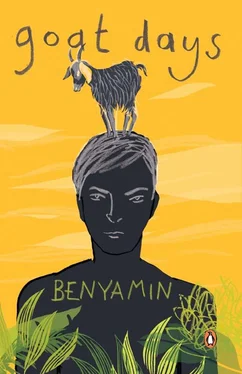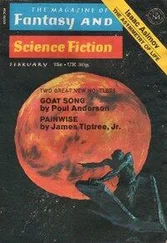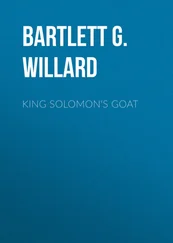We crept forward, and finally I was at the head of the queue. In the three minutes of waiting that followed, I felt a disquiet I find difficult to explain. I was called, and the policeman who had come with us also rose and followed me in. The warden had a register in front of him. Based on the paper the policeman handed over and some details he supplied, something was noted in the register. Then I was made to sign in the column at the left end of the page. After that I was led to another policeman who tattooed some Arabic letters on my forearm with some kind of ink. I had been to a madrassa as a child, so I knew enough to identify it as the number 13858. Maybe the only use I ever made of the madrassa education.
The hall I entered was an interesting place. Barbers sat in a line from one end to the other. The policeman at the door sent me to a barber who had just finished with another person. These men worked at unimaginable speed. One could only feel the movement of the trimmer on one’s head. It took them two minutes — at the most, three — to complete the job perfectly.
As I sat in front of the barber with my head bowed, I got a peep of Hameed sitting in front of the barber next to mine. We were done almost at the same time. I looked at Hameed’s face, and he at mine. Two baldies. We laughed. A rare moment of mirth in times of great sorrow!
We were then taken to the large prison building. It was larger than what is normally considered a large building. It was colossal, spread over two or three kilometres and separated into different blocks. Each block was so long that one couldn’t see the end of it. One block for each nationality — Arabs, Pakistanis, Sudanese, Ethiopians, Bangladeshis, Filipinos, Moroccans, Sri Lankans and then, finally, Indians. Most of the Indians were surely Malayalis. Naturally we were taken to the Indian block. It was full of bald-heads and stubble-heads. The length of the stubble varied according to the time of arrival. It was a good sight. It felt like I was a part of a Thursday fair of bald-heads. Our block was very crowded and there was too much commotion. Here, the notions of discipline, quiet and fear that the word jail evokes didn’t exist at all.
Hameed and I felt very lost in that crowd, like two foreigners landing in a city for the first time. It took some time for the truth to sink in — that I was finally in prison. For no apparent reason, I wept for a while. It was after days of deliberation, reflection and calculation that I had resolved to come to prison. Despite its harshness, I had concluded that prison was the best option to survive my circumstances.
Yes, I landed myself in prison because of my desire to live.
Can you imagine how much suffering I must have endured to voluntarily choose imprisonment!
We got used to the ways of the prison within a short time. The commotion we had witnessed when we first came in was post-lunch activity. Prison workers were busy collecting plates. Lunch here was served immediately after dhuhur prayer. We missed lunch that day. However, compared to the suffering I had endured, regretting a missed meal seems ludicrous.
The prisoners chitchatted languorously into siesta. Lethargic after the meal, many slept. The block didn’t have cots, mats or mattresses. One just found a spot on the bare floor. For someone used to luxuries, the heat must have been unbearable; the purring of the three or four ACs set pretty high on the walls provided little relief.
There must have been about two hundred and fifty people in our block. The prisoners, lying down in whatever space they could manage, resembled dead bodies laid out after a natural disaster. Those who weren’t asleep, sat in circles and talked. After noting the two new arrivals, someone from a Malayali-looking cluster looked up to say, ‘Don’t worry, most of us here are Malayalis. Join any group you like,’ and returned to the discussion.
Hameed and I found a corner and sat there on our own, not joining any group. Exhausted from the long journey and lack of sleep, we started to doze off almost immediately. But, before long, the azan for the asar prayer sounded. Here and there, people woke up and sluggishly headed towards a space set aside for prayer. We also joined them. Along with the others, we turned our faces towards Kaaba to pray to Allah, the merciful.
Bismillah al Rahman al Rahim …
While in prayer I could feel my past miseries flowing out in a torrent. I wept tears of joy as I recalled the affection of merciful Allah who had protected me all through my ordeal and helped me journey through the long sandy expanse of misery!
As I got up from that prayer offering all my sorrows and happiness to Allah, the bell rang. The sleepers woke up and took their position in the queue that was taking shape at another corner of the block. Although we didn’t know what it was for, we followed the crowd. As the queue moved forward, a big tea vessel came into sight. We could pick up a cup, fill it with tea, get two or three biscuits from the next table, and sit anywhere to have it at peace. When the tea was over, the cup had to be washed clean and returned to the table. It did not seem like being in a prison at all. It was more like a disaster-relief camp. Inside the block, one could walk and talk freely. I had desperately craved for this in the past three or four years — the chance to talk to someone. Just to exercise my newfound freedom, I kept chatting with Hameed. I didn’t give him any opportunity to speak. I talked greedily. My tongue didn’t remain still even for a second. Hameed, who knew me well by now, lent me his ear most patiently. I must have repeated the same stories to Hameed several times over. But I wasn’t satiated.
By the evening, someone from the nearby Indian block came to visit me. I don’t recall his name now. As soon as he saw me, he shook my hands and smiled. ‘Allah is compassionate,’ he said, as if to himself. He enquired if I was the one who had made it to Kunjikka’s shop. I nodded yes.
‘I know. After hearing about you, I went there to see you once. But you were asleep and I didn’t wake you up.’ Again he shook my hands and said, ‘Allah is compassionate. I came here only two days ago — a scuffle with the sponsor. It’s all right. Kunjikka will bail me out.’ He kept talking. Every so often, he would clutch my hand and praise Allah a hundred times. I started to weep. And, I don’t know why, that stranger also wept with me. Then, praising Allah, he returned to his block.
After that, many others from that block came to visit me. No one asked me anything. They had heard my story from that stranger. They only wanted to see me, and they looked at me in amazement. Some shook my hands and consoled me. Those were in my block also heard my story from those who had visited me.
Breaking away from their groups, most of the Malayalis in the block gathered around me. Some gazed at me as at an alien, some with wonder, some with awe, some with pity and a few with suspicion. Anyhow, I learned that within a few hours I was the topic of conversation among all the Malayalis in the prison. In the days that followed, many more came to see me and made me speak at length. I didn’t offend any of them — I fed my insatiable appetite for talking. I mentally revisited every moment of my story a thousand times and my mind and feet were ablaze as if I were walking on burning sands.
That evening, as we sat for dinner after maghreb , all the Malayalis in the block were with me. I didn’t have anything to give them in return for their love, except some tears.
In the jail, meals were served after different prayers. After the early morning subahi prayer, a glass of milk for everyone. At nine o’clock tea was ready and could be had any time until breakfast which was khubus and daal curry. Around noon, after the dhuhur prayer, lunch was served. It was always some kind of Arab biryani called majbus or kabsa . It was brought in large plates, one for at least ten people. We would sit around the plates in Arab style and eat. The meat in the biryani was different every day: chicken, mutton, camel. When it was mutton, I wouldn’t eat that meal.
Читать дальше




![Джон Харгрейв - Mind Hacking [How to Change Your Mind for Good in 21 Days]](/books/404192/dzhon-hargrejv-mind-hacking-how-to-change-your-min-thumb.webp)







